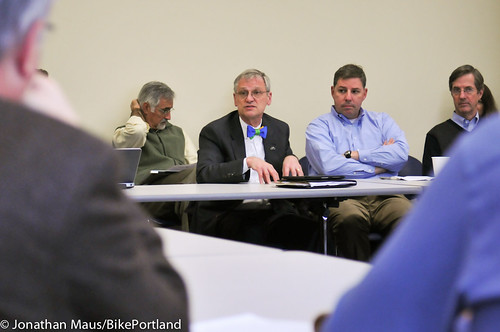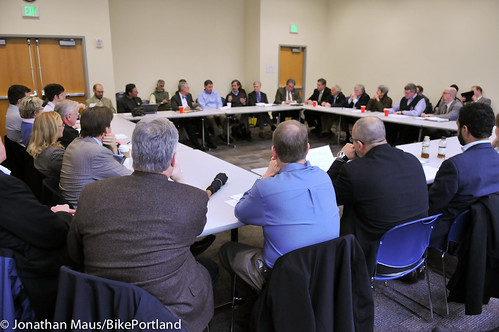
U.S. Congressman Earl Blumenauer led a closed-door meeting on Friday afternoon with representatives from a wide swath of transportation-related interests across Oregon. His goal was to hear concerns and gather input — from union and business leaders to advocates and agency officials — about the House transportation bill that passed out of committee last week.
“It’s troubling on several levels… it’s a reality check.”
— Congressman Earl Blumenauer
With a key vote (or votes) expected this week, Blumenauer told the assembled group he needs ideas and input to take back to D.C. to aid his work on a plan to help shape the legislative direction of the bills.
“The last two weeks were really unusual,” Blumenauer said at the meeting’s outset. “I don’t think I’ve ever seen anything like it.” Blumenauer said transportation infrastructure has long been “a bipartisan island” on the Hill, but he accused Republicans of ramming the House bill (H.R. 7) through committee without any hearings, without letting Democrats see it first, and then, “boom, right into markup.”
“It’s troubling on several levels,” said Blumenauer, and then added, “it’s a reality check.”
With the House bill quickly going from bad to worse, Blumenauer said they’d hoped to coalesce behind the Senate bill (MAP-21) but that bill has its own issues and he’s not comfortable with it either. “Now the path forward,” he told officials on Friday, “is not clear.”

Hoping to find some clarity, Blumenauer then asked each person in the room to share concerns and thoughts. Seated around a conference table at the State of Oregon office building in the Lloyd Center were a diverse set of transportation influencers who were more than willing to help. They included (not a complete list):
- Jason Tell, ODOT Region 1 Manager
- Mike Salsgiver, executive director for the local chapter of Associated General Contractors
- Steph Routh, executive director for the Willamette Pedestrian Coalition
- Jay Clemens, president and CEO of Associated Oregon Industries
- Dan Blocher, senior director of capital projects for TriMet
- Lynn Peterson, Sustainable Communities and Transportation Policy Advisor for Governor Kitzhaber
- Bill Wyatt, executive director for the Port of Portland
- Tom Miller, PBOT Director
- Chris Rall, regional organizer for Transportation for America
- Karen Schilling, land use and transportation planning manager for Multnomah County
- Tom Hughes, Metro President
- Rob Sadowsky, executive director for the Bicycle Transportation Alliance
- Debra Dunn, Oregon Trucking Association
- Heidi Guenin, Upstream Public Health
- Lynn Lehrbach, Oregon Teamsters
- Graham Trainor, political director for Oregon AFL-CIO
While the attendees have disagreements over projects and funding priorities, disgust with H.R. 7 and a general lack of progress on a long-term transportation funding bill (the existing one technically expired 2 1/2 years ago) brought them all together.
As Blumenauer scribbled notes, each attendee weighed in.
“The Safe Routes to School program is critical to East County in particular. We’ve got schools in Troutdale and Wood Village that participate in it… Those are critical areas that need help.”
— Karen Schilling, Multnomah County
ODOT’s Jason Tell said his agency is “very concerned,” and that personally he’s “a bit shocked right now” that H.R. 7 would bring less money to Oregon in the coming years. “This bill goes backwards… Oregon’s share [of funding] is going the wrong way.”
Representatives from the building trades and unions said their biggest concern was simply getting back to work. Private construction jobs have all but dried up, said Mike Salsgiver of Associated General Contractors, to the point where currently only about 6 percent of their work comes from the private sector (down from a normal level of about 35 percent).
Seeing hope in large projects like the CRC, Salsgiver made a special plea. “There’s been a lot of discussion [about the CRC]… But the bottom line is we need that project. It’s time to move. We’re very strong about that. Any legislation that impacts our ability to get that project will be a problem for us.”
Salsgiver’s CRC push was echoed by several others around the table. John Molis with the Oregon Building Trades Council implored Blumenauer to fund more infrastructure projects and he reiterated, “strong support to move the CRC forward as fast as we possibly can.” Debra Dunn with Oregon Trucking Association called the bridge “a stop light” on I-5 saying, “This economy needs the bridge.”
“The impacts to the city of Portland are very very real.”
— Tom Miller, PBOT
Tom Hughes, the president of Metro, said his main concern with the bill is how it strips away dedicated money for planning and staff. “In many respects, the Portland metro area transportation system has become a model because of the quality of thought that goes into what we do,” said Hughes, “A lot of that planning falls on my agency.”
“Our ability to continue that collection of talented people to do those jobs is at risk if this moves forward,” he said.
The House bill would eliminate funding for Safe Routes to School. That provision is a major concern for Karen Schilling, planning manager for Multnomah County. “The Safe Routes to School program is critical to East County in particular. We’ve got schools in Troutdale and Wood Village that participate in it… Those are critical areas that need help.”
Robert Ping with the Safe Routes to School National Partnership said his group is “devastated” by H.R. 7. “We’ll survive no matter what,” he said, citing the strength of a movement that hopes to be in 14,000 schools across the U.S. by year’s end. “But without federal funding,” he added, “We’ll be stepping backwards.”
TriMet would be significantly hit by provisions in the House bill to cut key funding programs and to move others out of dedicated pots created by the Highway Fund and into the General Fund. TriMet’s capital projects manager Dan Blocher said their budget could take a 15 percent — or $44 million — cut. “There’s an awful lot in this bill not to like,” he said.
Another TriMet rep at the meeting said the elimination of the Congestion Mitigation and Air Quality (CMAQ) grant program could put the agency’s general fund at risk because they’ve already bonded against it all the way out to 2027.
PBOT Director Tom Miller spoke of local consequences: “The impacts to the city of Portland are very very real.” He also spoke up for the lack of priority the bill gives to bicycling, which he referred to as, “The cheapest, most cost-effective means of urban transportation.”
From ODOT’s perspective, the bill’s 1950s Interstate Highway System mentality is the exact opposite from the direction they’re headed. Lynn Peterson with Governor Kitzhaber’s office said, “We’ve moved towards a system of moving people and freight, not just [single-occupancy] vehicles.”
Peterson said given the trend that teens no longer clamor for auto licenses like they used to, and that our population is aging, we must invest in a “complete system.” “We should have multiple ways to move around… a back-up system.” Peterson also said that it would be impossible for Oregon to meet its Energy Action Plan goals without sufficient investment in non-auto modes.
Rob Sadowsky with the BTA said he’s concerned an FHWA safety grant program they’ve used to fund police enforcement near schools will no longer be available. The bigger picture, he added, is that, “Regardless of what happens, we’ll see fewer dollars over time,” so he urged action on a regional transportation funding package.
Complaints about the bill were numerous, but one of the larger themes was how the bill would lead to the dissolution of a powerful coalition that has been forged in our region over the past several decades. With pots of money relied upon by transit, biking, walking, and freight interests either wiped out entirely or “being left adrift” in the general fund, many fear that Republicans are pushing a “divide and conquer” strategy.
The idea, a cynical observer noted, is to, “Pull these funds into the general fund and eventually kill them because the constituency isn’t strong enough to fight for them.” Facing scarce dollars and floating in the sea of the general fund, many fear that past allies who have worked together in the past for a robust, multi-modal transportation bill, will now turn against each other to save themselves.
In closing remarks on Friday, Blumenauer said, “It would be a shame to lose the momentum of our coalition, the consensus that is reflected around this table.”
Ultimately, Blumenauer expressed confidence that the existing House bill would not move forward as is. “This bill is not going to pass in its current form,” he said, “I hope it’s thumped sooner or later. With your thoughts and observations, we can do it right the next time around.”
Stay tuned.
Further reading:
– Obama Budget Proposes $476 Billion for Transportation Over Six Years – Streetsblog DC
– House Republicans facing big test as $260 billion highway bill heads for cliff – The Hill

